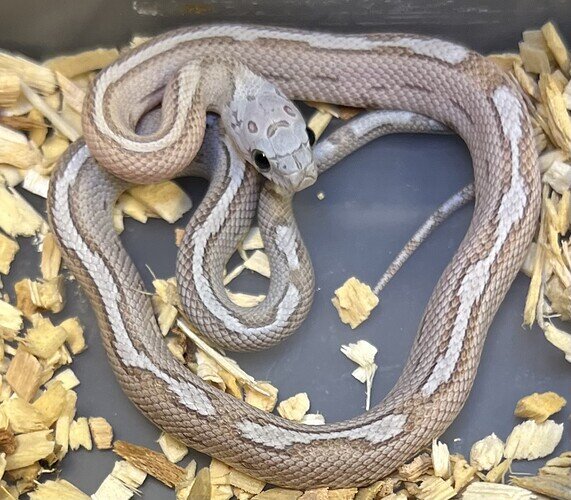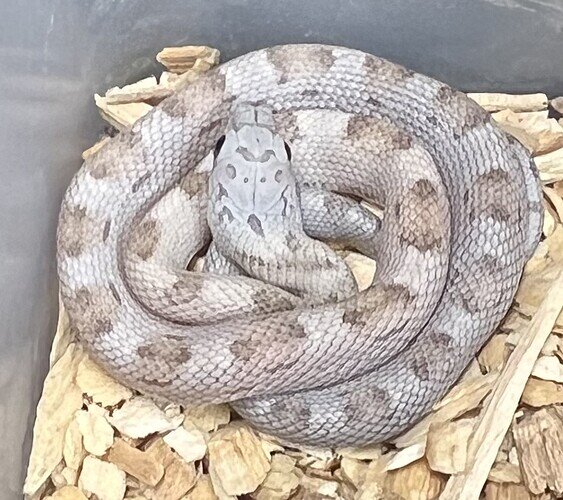Oh wow thanks for this. I had my friend double check. They’re too small to probe so we popped them and they are females it seems. I will unlist them now and let them grow. I held back a female shatter motley and she re popped as female also. I appreciate you letting me know.
I’ll get some size on them - they’re both eating great and then I’ll have my local friend probe them. If they’re females they will be kept!
Do you happen to know the genetics of the grandmother (the mom’s mom)?
Unfortunately, I don’t but these are great to hang onto until I have my local herp patriarch, Brad, sex them for me.
Okay, sounds good. I was just thinking that if the grandmother on the mom’s side was homozygous cinder, she would have had a 50% chance of passing the het cinder to your female on her W chromosome, rather than the Z chromosome, on which it’s usually located. Which would mean your het cinder female would be able to produce homozygous cinder female babies. But if you got for sure males from this clutch, that wouldn’t make sense. Basically if a het cinder female corn has the cinder mutation on her Z chromosome, bred with a homozygous cinder male, any homozygous cinder babies from the pairing will be males. If she’s het cinder on her W chromosome, any homozygous cinder babies should be female. (Other than the very tiny chance of a crossing over event happening, which could produce offspring of the opposite sex. I’m not sure what the actual odds of that happening are, but supposedly very, very low chance.)
That’s my understanding of it anyway. I’m no geneticist!
Thank you for taking time to explain and help me — you’ve been a great help since my first post!
Tricky, tricky cinder.
I’m fortunate to have a local friend who’s been our expert for over 50 years. I have another clutch of SK Miami that will need to be sexed in a few weeks so I’ll be seeing him.
I can’t add a thing to the tidy explanation @solarserpents gave of Cinder genetics as we understand them. Just gotta say nicely done, much appreciated! ![]()
I just hatched a couple more Miami shatters from a Miami het cinder amel Sunkissed female that popped as males right away.
The previous two that I listed still pop as females. I think they’re great candidates for me to try the genetic testing offerred here.
Since I have more males now, this “keeper” male is probably gonna leave me.
Would you say honey motley? ![]()
Man, he is gorgeous. Love everything about him.
Thank you!
Looks more like a moustache to me! An amazing animal too!
It is was killer clutch for sure
It’s kind of bittersweet. I’m visually thrilled but the sex situation with cinder has me discouraged.
Definitely beauties.
I would, yes. @solarserpents, would you?
I think so? That Miami het cinder look is so strong that it’s making it really hard to tell. But he definitely has a bit of yellow and I don’t see any other option for what he could be with that pairing.
That bit of yellow is what had me, as well.
Hey @mvite, did you ever end up confirming the sexes of your female cinders? I also hatched a clutch of cinders this year from a female het cinder to a male homozygous cinder, expecting any homozygous cinder babies to be male, but of the 7 cinders who hatched, 5 of them are popping and probing female. I’m no geneticist, but I’m wondering if it’s possible that certain cinder lines are more prone to having crossover events and therefore producing both sexes in a clutch?
Hi there I have sent in sheds for testing. I sent two last week so I’m not sure of turnaround time but I’ll definitely update here.

